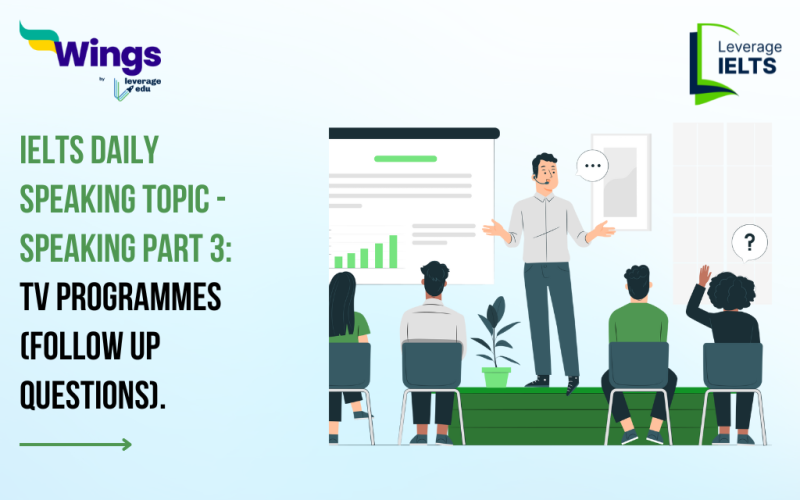Discussion Topics
- Types of TV Programmes
- Impact of TV Programmes
- TV Programmes vs. Online Streaming
Follow-up questions
1. Types of TV Programmes
Q.1. Why are reality shows popular?
Ans. Reality TV shows are immensely popular because they provide a sense of connection and excitement. They frequently depict individuals navigating extraordinary circumstances, offering both entertainment and motivation to audiences. The unscripted nature of these shows adds an element of suspense, as viewers are left in anticipation of what will happen next. Additionally, reality TV often incorporates viewer participation through voting or feedback, further engaging the audience.
Q.2. How are documentaries different from other TV programmes?
Ans. Documentaries are a form of non-fiction content designed to educate and enlighten viewers on specific subjects or topics. Unlike other television programs, they typically adopt a more serious tone and delve deeper into the subject matter. Documentaries are meticulous in presenting information in an organised manner, providing comprehensive insight into the chosen topic. Furthermore, they often maintain a neutral perspective, presenting facts without bias.
2. Impact of TV Programmes
Q.1 How do TV programs influence society?
Ans. Television programs wield the power to influence society in various ways. They can shape opinions, raise awareness about critical concerns, and foster cultural understanding. For example, a documentary on climate change has the potential to heighten awareness of environmental issues and sway opinions toward embracing more sustainable practices. However, it is essential to handle TV programs responsibly, as they can inadvertently reinforce stereotypes and spread misinformation if not carefully managed.
Q.2. How can the negative impacts of TV programs be mitigated?
Ans. The negative impacts of TV programs can be mitigated through responsible broadcasting, media literacy education, and viewer discretion. For instance, broadcasters can contribute to a positive impact by adhering to ethical guidelines in the creation and dissemination of content. Media literacy education programs can empower viewers to critically analyze information, distinguishing between credible and misleading content. Parents, exercising discretion, can actively engage with their children in discussions about the content they consume, such as guiding them away from age-inappropriate material or discussing the potential influence of certain programs on their perspectives.
3. TV Programmes vs. Online Streaming
Q.1. How has online streaming changed the way content is produced?
Ans. The rise of online streaming platforms has sparked an increase in the creation of top notch and diverse content. It has also provided a platform for more niche and experimental content to reach its intended audience. As a result, we now have a greater range of stories being told including those that may not have been deemed commercially viable for traditional television.
Q.2. How has the rise of online streaming platforms affected traditional TV programmes?
Ans. The advent of streaming services has resulted in a reduction in the number of individuals tuning in to traditional television. A growing number of viewers are choosing streaming platforms for their convenience, extensive content selection, and the absence of interruptions from commercials. This trend has prompted traditional broadcasters to reevaluate their approaches and adapt to the dynamic shifts in the media landscape. Consequently, they are compelled to innovate and deliver content that resonates with the preferences of today’s audience, which increasingly values the flexibility and uninterrupted viewing experiences provided by streaming services.
Are you preparing for IELTS? Check out this video to improve your speaking skills for the IELTS exam given below👇.
| Related Blogs | ||
| IELTS Eligibility: IELTS Exam Age Limit & Qualification | IELTS Exam 2023 Dates, Registration, Result, Preparation | IELTS Sample Tests: PDF (Download), Exam Pattern |
| IELTS Marking Scheme | IELTS Scoring System & Grading | IELTS Test Centres in India | IELTS Syllabus 2023 & Section-Wise Exam Pattern |
Download the Leverage IELTS App today.


Need help to prepare for IELTS? Check out the best IELTS preparation courses in the market offered in a live training environment by trusted educators in a live training environment. If you want help studying abroad, call 1800-572-130.


 One app for all your study abroad needs
One app for all your study abroad needs












 60,000+ students trusted us with their dreams. Take the first step today!
60,000+ students trusted us with their dreams. Take the first step today!